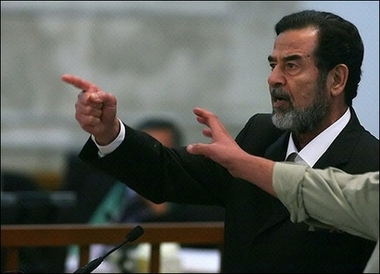 By Alistair Lyon, Special Correspondent BEIRUT (Reuters) – Saddam Hussein’s death sentence on Sunday evoked satisfaction in countries he invaded, sorrow among his Palestinian admirers and resentment from some Arabs who see him as the victim of a U.S.-inspired show trial.
By Alistair Lyon, Special Correspondent BEIRUT (Reuters) – Saddam Hussein’s death sentence on Sunday evoked satisfaction in countries he invaded, sorrow among his Palestinian admirers and resentment from some Arabs who see him as the victim of a U.S.-inspired show trial.
Kuwaitis, who suffered a seven-month Iraqi occupation in 1990-91, applauded the Baghdad court’s decision that the former Iraqi president should hang for crimes against humanity. This is good news," Kuwaiti political analyst and former oil minister Ali al-Baghli said. "Saddam deserves to be hanged because of the atrocities he inflicted on his people for the past 35 years and on his neighbours also. He sent millions of people to their deaths."
Iran said it hoped Saddam, who was convicted over the deaths of more than 148 Shi’ite men from the Iraqi town of Dujail, would still be brought to book for offences it accuses him of committing during the 1980-88 Iran-Iraq war. Ali Farhoudi, a 38-year-old veteran of that conflict, expressed a widely held view among Iranians that the noose was too merciful a punishment for the former Iraqi president.
"What I have suffered during the war will never be compensated, even if he is hanged 100 times," Farhoudi said.
Soroush Ramazani, too young at 17 to remember the war, said Saddam deserved to be tortured to death for his crimes.
"Maybe in the afterlife the tortures that God will give him in hell will be a better punishment," said Hossein Vahidi, 24.
Iran’s Foreign Ministry spokesman Mohammad Ali Hosseini said his country welcomed the verdict, adding that: "Although Saddam and his allies carried out those crimes, it should not be forgotten that Saddam’s Western supporters also paved the way for him to carry out those oppressive acts and crimes."
PALESTINIAN SYMPATHY
There was widespread sympathy for Saddam, however, among Palestinians who had admired him for defying the United States and for firing missiles at Israel in the 1991 Gulf War. He also sent money to families of Palestinian suicide bombers.
"I am very sad today. Giving the death penalty to the Iraqi president is oppression, it is unfair," said weeping housewife Najah Jabajy, 30, in the West Bank city of Nablus.
Osama Issa, a 23-year-old tradesman, said: "This is an insult to the Arabs. Saddam committed big mistakes. But look at Iraq today: blood and daily massacres."
Fawzi Barhoum, a spokesman for the governing Palestinian movement Hamas, said the verdict was politically motivated.
"The trial … was a message to the entire Arab and Muslim world of the fate of those who do not obey the orders of the United States (and) who clearly support the Palestinian people."
Abo Kifah Alqawasmeh, 56, manager of a health clinic in the West Bank city of Hebron, called it a "black day" for Arabs.
"Saddam Hussein is a symbol of Arab dignity and a real leader against Arab enemies in the Middle East," he said.
Elsewhere in the Arab world, reaction was muted, even though many view Saddam’s trial as a U.S.-orchestrated mockery.
"Any trial conducted under occupation is illegitimate," Syrian Information Minister Muhsin Bilal told reporters in Damascus when asked about Syria’s view of the verdict.
"We would have celebrated if the verdict was to hang all American soldiers in Iraq," said Yemeni student Yousef Melfi.
Hamid al-Mohkami, a school teacher in Sanaa, dismissed the trial as a charade, but said Saddam deserved to die anyway.
Mustafa al-Sayyid, political scientist at Cairo University, described the trial as "victor’s justice", adding: "The law on the basis of which this trial was conducted was not an Iraqi law but a foreign law, imposed by occupation authorities."
Magdi Mohamed Ahmed, a 51-year-old Egyptian street vendor, decried what he called a "show trial sponsored by America" and said Saddam would die a "martyr for his nation".
Hilal Khashan, a political science professor at the American University of Beirut, said such sentiments might be common, but that a humiliated Saddam could no longer move Arab masses.
"He is not seen as a hero, he’s a fallen leader who has exited Arab consciousness," Khashan said.
Baghli, the Kuwaiti analyst, said other Arab leaders should take note of Saddam’s fate and realise their immunity from punishment might not last:
"You don’t know — one day or another the situation will be upside down, like in Iraq".
(Additional reporting by correspondents in Kuwait, Tehran, Nablus, Gaza, Hebron, Cairo, Sanaa and Damascus)
Copyright © 2006 Reuters



